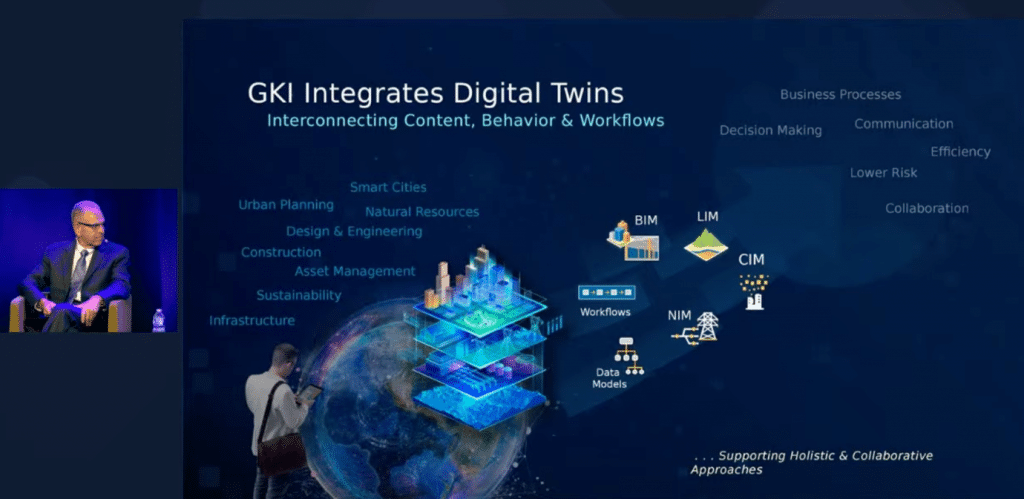
The role of geospatial capabilities is immense in managing global challenges such as climate change, health, urbanization, and developing local enterprises to create local wealth and security. Geospatial knowledge (GK) underpins the decision-making on all the current global challenges and was discussed in Plenary 4 sessions https://geospatialworldforum.org/plenary.asp#Plenary-4
on Geospatial Knowledge Infrastructure (GKI): Advancing Sustainability Through Collaborative Workflow at Business Center of Amersfoort, Netherland on 9 May 2022. The session was moderated by Ron Bisio, Senior Vice President, Trimble, USA.
During the 90-minute discussion, Mr. Bisio and the seven panelists explored the most significant opportunities for the geospatial technology collaboration to create new knowledge to respond to global challenges.
Participants of this panel were Nigel Clifford, Deputy Chief, Geospatial Commission, UK, Dean Angelides, Corporate Director, International, Esri, USA, Alain De Taeye, Board Member, TomTom, The Netherlands, Greg Scott, Global Geospatial Information Management, Environment Statistics and Geospatial Information Branch, United Nations Statistics Division, USA, Ingrid Vanden Berghe, Director, National Geographic Institute, Belgium, Tomaz PETEK, Director General, Survey and Mapping Authority, Slovenia, and
Jim Van Rens, Strategic Advisor, Government & Industry Relations, RIEGL, USA.
Greg Scott, Global Geospatial Information Management, Environment Statistics and Geospatial Information Branch, United Nations Statistics Division, USA, insisted on the need for collaboration to respond to global challenges as Geoinformation is cross-cutting in nature and affects all.
“Take the example of climate change challenge before mankind. It is a long distance and has a long-term effect. But one common dimension is that it affects all people beyond political boundaries” said Scott.
He also appreciated the role of the GWF platform which provides an opportunity to think about collaboration.
“A few years back, there was no real understanding over geospatial information that how it would help in achieving sustainable development goal but the consistent effort of GWF like platform make people believe that Geoinformation is a cross-cutting in nature and affects all development activities” he further explained.
Alain De Taeye, Board Member, TomTom, urged the need for collaboration between users, industry, and government to create new geospatial knowledge.
He says, ‘Need for collaboration is driven by the availability of massive data generated in the past 10 years as the use of sensors increased in all kinds of consumer products. For example, GPS sensors not only allow navigation application but also captures what is happening around too.’
He presented that TomTom generates 61 billion data points per day globally, from 600 million connected different devices such as In-dash navigation, Smartphones, Telematic device, and Personal navigation devices. Collaboration between users of those sensors between car industry/fleet systems and mobile phones.
“These sources of information need to collaborate to make a new geospatial knowledge for use for industry and people” he reiterates.
Panelists all agreed that Geospatial knowledge Infrastructure is for evidence-based decision-making and there is a need for collaboration to create new knowledge.
Dean Angelides, Corporate Director, International, Esri, USA, said that GKI integrates digital twins, and interconnects content, behavior, and workflows.
However, Nigel Clifford, Deputy Chief, Geospatial Commission, UK, has also encouraged collaboration with the government and private sector but cautioned about the unethical use of personal data which can hinder the geospatial sector growth.
“It is a delicate task where we need to be careful about the use of data for public and personal benefit instead of for profit only,” says Mr. Clifford.
All panelists made a consensus over the need for collaboration in GKI as it is a critical component of national infrastructure and knowledge economy that provides a nation’s blueprint of what happens where, and the means to integrate a wide variety of government services that contribute to economic growth, national security, sustainable social development, environmental sustainability, and national prosperity.
© Geospatial Media and Communications. All Rights Reserved.